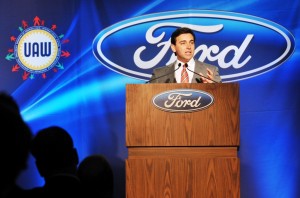
Ford promised to double profits next year. It’s fate is in the hands of customers, currency valuations and the cost of warranty repairs and recalls.
The Detroit Three – FCA, Ford Motor and General Motors all posted 2014 profits that were sharply down from a year earlier in a booming global auto market, but each had different reasons for the steep declines.
This, of course, in stark contrast to other global automakers, notably Volkswagen Group, and Toyota Motor Corporation, both with record breaking results.
At FCA, the renamed Fiat Chrysler, merger costs gobbled up huge amounts of money for a 56% decline in profits to $1.2 billion. These result even though global sales rose 15% to 2.8 million vehicles. A large part of the drop was caused by charges of $1.17 billion to erase debt and make payments to the United Automobile Workers union for stock it owned as part of Chrysler’s bankruptcy reorganization in 2009 that eventually turned over ownership of Chrysler to Fiat. Last year the company also benefited from a huge, one-time tax break. The former Chrysler Group with its strong earnings from Ram pickups, minivans and Jeeps has been propping up earnings at an ailing Fiat ever since.
Ford Motor posted net income of $3.2 billion, or 80 cents per share in 2014. This was $4 billion lower than a year ago, including the non-repeat of a favorable fourth quarter $2.1 billion tax special item from a year ago. Only North America – at $6.9 billion and Asia Pacific at $589 million – made money. Wholesale volume was about equal with 2013, while company revenue declined 2%. Ford vowed to double profits in 2015.
General Motors reported 2014 full-year net income of $2.8 billion, or $1.65 per diluted share, down from 2013 at $3.8 billion or $2.38 per diluted share. Automotive operating performance improved in 2014, but results were offset by huge incremental recall and restructuring costs, and a net loss from special items. As a result, these “special items” during 2014 cut full-year net income unfavorably by -$2.4 billion or -$1.40 per diluted share, compared to an unfavorable -$1.3 billion impact in 2013. During 2014, full-year net income was also cut by recall-related pre-tax costs of $2.8 billion, or -$1.07 per diluted share.

